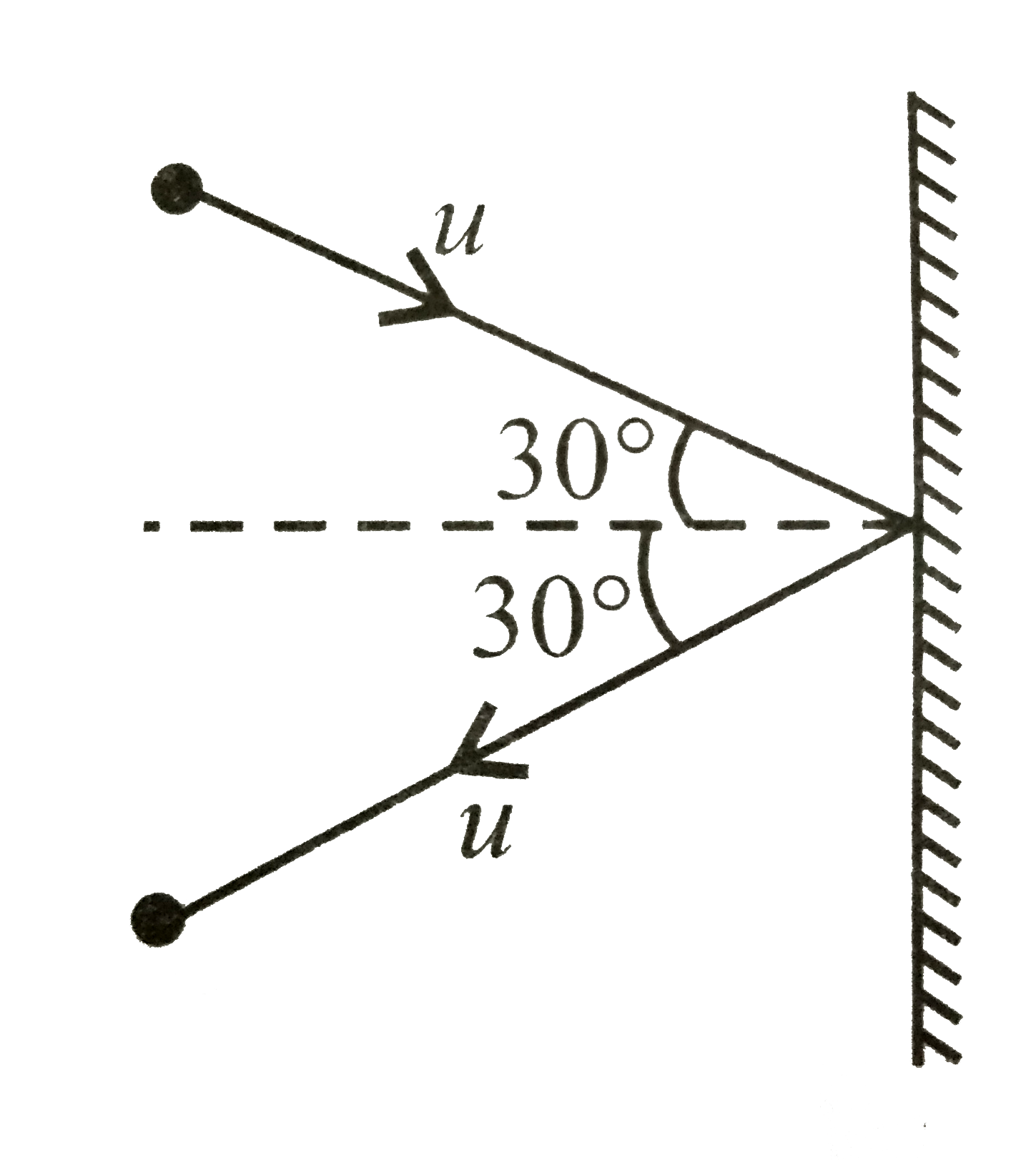Two billiard balls of mass 50 g moving in oppositedirections with speed of 16ms−1 collide and rebound with the same speed. What is the impulse imparted by ech ball to the other?
To solve the problem of finding the impulse imparted by each billiard ball to the other during their collision, we can follow these steps:
Step 1: Understand the Given Data
- Mass of each billiard ball, m=50g=0.05kg (conversion from grams to kilograms).
- Initial speed of each ball, u=16m/s.
- After the collision, both balls rebound with the same speed, v=−16m/s (the negative sign indicates the opposite direction).
Step 2: Calculate the Initial Momentum of Each Ball
The momentum p of an object is given by the formula:
p=m⋅v
For the first ball (moving in the positive direction):
p1=m⋅u=0.05kg⋅16m/s=0.8kg m/s
For the second ball (moving in the negative direction):
p2=m⋅(−u)=0.05kg⋅(−16m/s)=−0.8kg m/s
Step 3: Calculate the Final Momentum of Each Ball After Collision
After the collision, the first ball rebounds in the negative direction:
p′1=m⋅v=0.05kg⋅(−16m/s)=−0.8kg m/s
The second ball rebounds in the positive direction:
p′2=m⋅v=0.05kg⋅16m/s=0.8kg m/s
Step 4: Calculate the Change in Momentum for Each Ball
The impulse J imparted by one ball to the other is equal to the change in momentum:
J=Δp=p′−p
For the first ball:
J1=p′1−p1=(−0.8kg m/s)−(0.8kg m/s)=−1.6kg m/s
For the second ball:
J2=p′2−p2=(0.8kg m/s)−(−0.8kg m/s)=1.6kg m/s
Step 5: Conclusion
The magnitude of the impulse imparted by each ball to the other is:
|J|=1.6kg m/s
Final Answer
The impulse imparted by each ball to the other is 1.6kg m/s.
---
- Mass of each billiard ball, m=50g=0.05kg (conversion from grams to kilograms).
- Initial speed of each ball, u=16m/s.
- After the collision, both balls rebound with the same speed, v=−16m/s (the negative sign indicates the opposite direction).
The momentum p of an object is given by the formula:
p=m⋅v
For the first ball (moving in the positive direction):
p1=m⋅u=0.05kg⋅16m/s=0.8kg m/s
For the second ball (moving in the negative direction):
p2=m⋅(−u)=0.05kg⋅(−16m/s)=−0.8kg m/s
After the collision, the first ball rebounds in the negative direction:
p′1=m⋅v=0.05kg⋅(−16m/s)=−0.8kg m/s
The second ball rebounds in the positive direction:
p′2=m⋅v=0.05kg⋅16m/s=0.8kg m/s
The impulse J imparted by one ball to the other is equal to the change in momentum:
J=Δp=p′−p
For the first ball:
J1=p′1−p1=(−0.8kg m/s)−(0.8kg m/s)=−1.6kg m/s
For the second ball:
J2=p′2−p2=(0.8kg m/s)−(−0.8kg m/s)=1.6kg m/s
The magnitude of the impulse imparted by each ball to the other is:
|J|=1.6kg m/s
The impulse imparted by each ball to the other is 1.6kg m/s.
Topper's Solved these Questions
Similar Questions
Two billiard balls each of mass 0 .05 kg moving in opposite directions with speed 6ms−1 collide and rebound with the same speed What is the impulse imparted to each ball due to the other ?
View SolutionTwo billiard balls each of mass 0 .05 kg moving in opposite directions with speed 6ms−1 collide and rebound with the same speed What is the impulse imparted to each ball due to the other ?
View Solution
Knowledge Check
Two billiard ball A and B each of mass 50g and moving in opposite direction with speed of 5ms−1 each, collide and rebound with the same speed. The impulse imparted to each ball is
A0.25kgms−1B0.5kgms−1C0.8kgms−1D0.125kgms−1If two balls each of mass 0.06kg moving in opposite directions with speed 4m/s collide and rebound with the same speed , then the impulse imparted to each ball due to other is
A0.48 kg-m/sB0.24 kg -m/sC0.81 kg -m/sDZeroIf two balls each of mass 0.06kg moving in opposite directions with speed 4m/s collide and rebound with the same speed , then the impulse imparted to each ball due to other is
A0.48kgm/sB0.24kgm/sC0.81kgm/sDZero
Two billiard balls each of mass 50g moving in opposite directions with a speed of 36km/h colide and rebound with the same velocity What is the impulse imparted to each ball due to other ?
View SolutionTwo billiard balls A and B, each of mass 50 kg and moving in oppsite direction with speed of 5ms−1 each, collide and rebound with the same speed. If the collision lasts for 10−3s, which of the follwing statements are true?
View SolutionTwo billiard balls A and B, each of mass 50 kg and moving in oppsite direction with speed of 5ms−1 each, collide and rebound with the same speed. If the collision lasts for 10−3s, which of the follwing statements are true?
View SolutionTwo billiard balls A and B each of mass 50 g and moving in opposite directions with speed of 5m/s each, collide and rebound with the same speed if the collision lasts for 10−3 s which of the following statement(s) is (are) true?
View SolutionA ball of mass m strikes a rigid walJ with speed u and rebounds with the same speed. The impulse imparted to the ball by the wall is

View Solution
